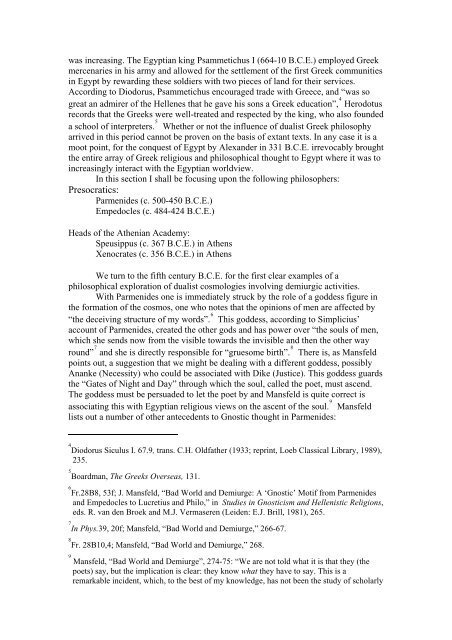THE EGYPTIAN FOUNDATIONS OF GNOSTIC THOUGHT
THE EGYPTIAN FOUNDATIONS OF GNOSTIC THOUGHT
THE EGYPTIAN FOUNDATIONS OF GNOSTIC THOUGHT
Create successful ePaper yourself
Turn your PDF publications into a flip-book with our unique Google optimized e-Paper software.
was increasing. The Egyptian king Psammetichus I (664-10 B.C.E.) employed Greek<br />
mercenaries in his army and allowed for the settlement of the first Greek communities<br />
in Egypt by rewarding these soldiers with two pieces of land for their services.<br />
According to Diodorus, Psammetichus encouraged trade with Greece, and “was so<br />
great an admirer of the Hellenes that he gave his sons a Greek education”, 4<br />
Herodotus<br />
records that the Greeks were well-treated and respected by the king, who also founded<br />
a school of interpreters. 5<br />
Whether or not the influence of dualist Greek philosophy<br />
arrived in this period cannot be proven on the basis of extant texts. In any case it is a<br />
moot point, for the conquest of Egypt by Alexander in 331 B.C.E. irrevocably brought<br />
the entire array of Greek religious and philosophical thought to Egypt where it was to<br />
increasingly interact with the Egyptian worldview.<br />
In this section I shall be focusing upon the following philosophers:<br />
Presocratics:<br />
Parmenides (c. 500-450 B.C.E.)<br />
Empedocles (c. 484-424 B.C.E.)<br />
Heads of the Athenian Academy:<br />
Speusippus (c. 367 B.C.E.) in Athens<br />
Xenocrates (c. 356 B.C.E.) in Athens<br />
We turn to the fifth century B.C.E. for the first clear examples of a<br />
philosophical exploration of dualist cosmologies involving demiurgic activities.<br />
With Parmenides one is immediately struck by the role of a goddess figure in<br />
the formation of the cosmos, one who notes that the opinions of men are affected by<br />
“the deceiving structure of my words”. 6 This goddess, according to Simplicius’<br />
account of Parmenides, created the other gods and has power over “the souls of men,<br />
which she sends now from the visible towards the invisible and then the other way<br />
round” 7<br />
and she is directly responsible for “gruesome birth”. 8<br />
There is, as Mansfeld<br />
points out, a suggestion that we might be dealing with a different goddess, possibly<br />
Ananke (Necessity) who could be associated with Dike (Justice). This goddess guards<br />
the “Gates of Night and Day” through which the soul, called the poet, must ascend.<br />
The goddess must be persuaded to let the poet by and Mansfeld is quite correct is<br />
associating this with Egyptian religious views on the ascent of the soul. 9<br />
Mansfeld<br />
lists out a number of other antecedents to Gnostic thought in Parmenides:<br />
4<br />
Diodorus Siculus I. 67.9, trans. C.H. Oldfather (1933; reprint, Loeb Classical Library, 1989),<br />
235.<br />
5<br />
Boardman, The Greeks Overseas, 131.<br />
6<br />
Fr.28B8, 53f; J. Mansfeld, “Bad World and Demiurge: A ‘Gnostic’ Motif from Parmenides<br />
and Empedocles to Lucretius and Philo,” in Studies in Gnosticism and Hellenistic Religions,<br />
eds. R. van den Broek and M.J. Vermaseren (Leiden: E.J. Brill, 1981), 265.<br />
7<br />
In Phys.39, 20f; Mansfeld, “Bad World and Demiurge,” 266-67.<br />
8<br />
Fr. 28B10,4; Mansfeld, “Bad World and Demiurge,” 268.<br />
9<br />
Mansfeld, “Bad World and Demiurge”, 274-75: “We are not told what it is that they (the<br />
poets) say, but the implication is clear: they know what they have to say. This is a<br />
remarkable incident, which, to the best of my knowledge, has not been the study of scholarly










